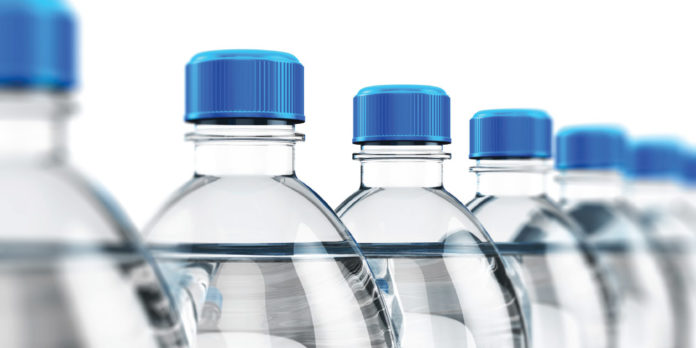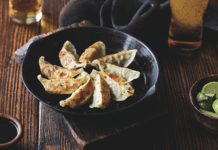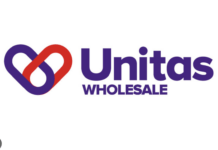Consumers want healthy drinks that taste good. SHIREEN KHALIL says flavoured bottled waters may be what they’re looking for.
The bottled water market is a force to be reckoned with, having achieved 9.4% growth over the past year, according to recent figures from research body Nielsen.
Data from IRI shows that bottled water is the fastest growing segment in the £7.3bn soft drinks category, up 10% in the year to March 25. Despite environmental concerns over plastic, its future looks promising, with the market tipped to double in size across the globe over the next six years.
The category’s growth is largely driven by health-conscious consumers – and the trend is particularly important, thanks to the tax levy on sugary soft drinks coming next April. In preparation for this, waters of various flavours and proclaimed nutritional benefits are hitting the market – adding to a crowded category that already contains numerous, traditional still and sparkling options from here and abroad.
It has become something of a mammoth task for wholesalers to get to grips with their bottled water range, and ensure that they are stocking the right blend of classic and innovative products to boost profits. And so, the question remains, how can wholesalers benefit from this trend?
Health-consciousness
Health-conscious consumers and busy Brits on the go need to be catered to if wholesalers want to succeed in the bottled water category, according to key suppliers. Jemma Healy, category manager at Danone Waters UK & Ireland, explains that a rising number of shoppers are shaping the marketplace significantly as they look to substitute sugary soft drinks for diet versions or plain water.
She notes that 40% of shoppers claim they bought food and drink on-the-go in May, compared to 33% last year. “Busier lifestyles mean most shoppers increasingly are conducting top-up shops, instead of going for one big weekly shop.”
Healy adds that while small multipacks account for a 5% value share of all bottled-water formats, they still offer retailers a good opportunity to capitalise on this changing behaviour and so should be stocked as a priority.
Highland Spring Group’s head of customer marketing Carol Saunders agrees that it comes down to offering variety. “Stocking a selection of formats and pack sizes from recognisable brands, helps retailers meet the needs of on-the-go occasions,” Saunders says.
To help wholesalers excel, Highland Spring is offering a range of promotional packs, including its newly-designed still water sports 500ml bottle in a deal of 24 bottles for 18.
Saunders says that it is also important for wholesalers to promote healthy drink alternatives to meet demand and maximise their sales.
“Highland Spring’s sparkling water has benefited from the health trend, as consumers search for sugar-free alternatives to sugary drinks but still want to have something special,” she says. “By strategically positioning water alongside soft drinks, wholesalers can reinforce this message to their customers.”
She adds: “As with all categories, continuous supply is incredibly important. The spikes in demand for water mean it’s even more vital that wholesalers manage their stock levels to meet these uplifts.”
Flavours
Research by MMR Research Worldwide shows that more than 12m households are now buying flavoured water. With the category growing at twice the rate of the soft drinks market, Nichols’ senior marketing manager Ed Jones says it was only natural for the company to venture into the category.
Earlier this year, Nichols released its first flavoured water product, Vim2o – a still spring water flavoured with the taste of carbonated soft drink Vimto.
Jones says: “Vim2o has no added sugar and is aimed at health-conscious people who don’t like the taste of plain water, but who want to ensure that they and their children stay hydrated throughout the day without compromising on taste.”
Jones says the no-sugar and no-added sugar sectors have seen big growth, but that they are under-serviced and consumers are not receiving the choice they deserve. “Our advice to wholesalers is to diversify their bottled water offerings,” he adds. “There’s a growing appetite for flavoured water – and brands that carve out a new approach with bottled water with no sugar will perform best.” Nichols has also just released a new product called Feel Good Infusions, which is infused with strawberry and mint.
Nestlé Waters has introduced Perrier Flavours to its bottled water range, in Green Apple and Lemon variants. Caroline Juin, Nestlé Waters’ marketing director, says: “Having performed exceptionally well in consumer-tasting, Perrier Flavours will contain natural ingredients, no sugar and just two calories. They’re the perfect option for shoppers seeking refreshing, sparkling, flavoured water while on the go.”
Danone’s flavoured waters include Volvic Touch of Fruit Lemon & Lime and Volvic Touch of Fruit Strawberry, both of which are available as original and sugar-free options.
“With this in mind, wholesalers should ideally offer both small and large formats to reach those shoppers who are on the go, as well as those buying water drinks to consume at home,” Healy says.
Going green
Coca-Cola European Partners (CCEP) trade communications manager Amy Burgess emphasises that demand from health-conscious consumers plays a vital role in the growth of the bottled water category.
She says that the bulk of bottled water sales by independent retailers are made up of a range of consumption formats, and stresses that it’s important for wholesalers to recognise the sales potential this offers.
CCEP’s Glacéau Smartwater, worth £38.3m since its launch in 2014, caters to consumers on the move as it comes in a variety of formats, providing choice. But apart from prioritising healthier alternatives and having sizeable options, wholesalers should consider the environmental impact of plastic bottles.
As the category grows rapidly, bottled water recycling is becoming increasingly important, with only one out of five bottles being sent to the recycling bin, according to environmental charity The Water Project.
CCEP’s Abbey Well Spring Water has a ‘twist’ bottle design that uses a third less plastic than standard bottles. Burgess says it was designed to be ‘greener’. “We’re encouraging consumers to recycle by featuring the words ‘recycle me’ on the label, together with a prompt to ‘peel me here’,” she notes.
Highland Spring’s Saunders adds: “Consumers want to know about the environmental impact and sustainable credentials of purchased products. By sourcing UK water, wholesalers are cutting down travel and important air miles, and consumers will recognise this.”
Wholesalers need to consider sizing variety, brand offering and flavour diversity, while keeping in mind the health and environmentally-conscious consumer when it comes to getting their bottled water range spot on.
Highland Spring Groups’ Top Five Tips
1. Increase space for increasing demand: With a prosperous Bottled Water category, wholesalers should consider increasing space to make the most of increasing demand
2. Cater to consumer trends: Since the release of the government’s Childhood Obesity Strategy in 2016, health is high on the consumer agenda. It is important for wholesalers to actively promote healthy drink alternatives to meet demand and maximise their sales
3. Right pack size, right format: Stocking a selection of bottle formats and pack sizes from recognisable brands will help your retail and foodservice customer meet the needs of on-the-go occasions.
4. In-depot merchandising: Merchandise according to your customer base is a simple, yet effective method of maximising sales and profits for wholesalers.
5. Visible and simplified fixture: Wholesalers should work with brands to create a highly visible and simplified fixture that is easy for the customer to navigate.








